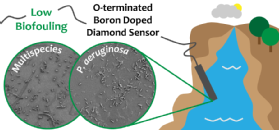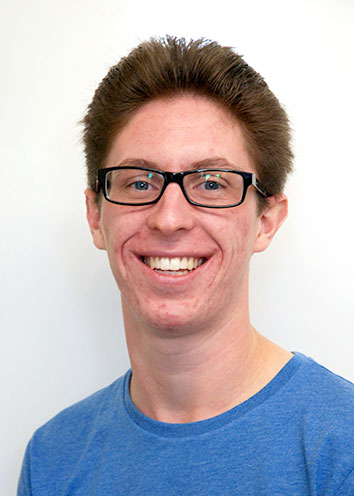Lee Simcox
PhD in Analytical Science
Development of All-Diamond Conductivity Sensors with Simultaneous Temperature Monitoring for Aquatic Environments, Prof. Julie V. Macpherson
The research involved in this project is the design and fabrication of a diamond-based conductivity sensor, from the manufacture of the diamond electrode, to the accompanying electronics, software and data analysis, in order to build a working sensor that will monitor conductivity and temperature simultaneously.
One of the main challenges that in-situ sensors for aquatic environments face is biofouling, in particular the formation of bacterial biofilms on the sensor surface which can impede its performance. We investigated the assertion that diamond offers a "reduced fouling" surface, by developing an assay-based protocol for quantifying biofilm formation on various materials, and examining the factors in play that affect biofilm formation and how these relate to diamond as a material for sensing.
Future research will involve the investigation of methods of cleaning the sensor so that it can be left in-situ for extended periods of time in seawater, ready for its application in aquatic environments such as natural waters.
Skills and techniques employed:
- Experimental
- Laser micromachining
- Interferometry
- Electrochemical impedance spectroscopy
- Electrochemistry
- Electronics & measurement science
- Optical microscopy
- Atomic force microscopy
- Contact angle measurements
- Confocal laser scanning microscopy
- Scanning electron microscopy
- Microbiological techniques & working with HG2 micro-organisms
- Optical density measurements & spectrophotometry
- Photolithographic microfabrication techniques
- Computational
- Low level G code programming to operate laser micromachiner
- Mathematical modelling in MATLAB
- Programming in LabVIEW
- Image analysis
- Data analysis and statistical analysis
The project is funded through MAS CDT with industrial contact from DSTL. We have established collaborations with:
- Prof. Liz Wellington in the School of Life Sciences, who has similar interests in biofilms in natural waters
- Process Instruments, a small-medium enterprise, to develop a sensor that can detect and monitor biofilm formation in-situ.
- Dr. Jonathan Pearson in the Engineering department, to analyse the performance of the conductivity sensor long-term in a real-world environment and under varying turbulent flow conditions.
Publications
- "Boron Doped Diamond as a Low Biofouling Material for Aquatic Environments: Assessment of Pseudomonas aeruginosa Biofilm Formation" by L. J. Simcox, R. P. A. Pereira, E. M. H. Wellington, and J. V. Macpherson, ACS Appl. Mater. Inter., 2019, 11, 28, 25024-25033. DOI: 10.1021/acsami.9b07245
Transferable Skills
- Undergraduate chemistry laboratory demonstrating and marking, involving the supervision of groups of 8-16 students across 2 experiments and the marking of their assessed written reports
- Outreach demonstrating for GCSE and A Level students
- Teaching workshops to small groups of students for an undergraduate electrochemistry course
- Worked on the 'Diamond: more than a gemstone' exhibit at The Royal Society Summer Science Exhibition 2016, involving the organisation and production of the exhibition stand, and interacting and communicating science to a wide range of event visitors (from school children to general public to VIPs)
Certifications
- LabVIEW Certified Associate Developer
- Level 2 Award in Food Safety in Catering
Conferences Attended
- Presented a poster at:
- Midlands Electrochemistry Group Conference 2016, 2017 and 2018
- The 67th De Beers Diamond Conference
- Molecular Analytical Science Annual Conference 2016
- 4th Analytical Biosciences Early Career Researcher Meeting
- Warwick Postgraduate Research Showcase 2018 - Runner Up for Best Poster
- Presented a talk at:
- Analytical Science Network's Bright Spark Symposium 2016
- Molecular Analytical Science Annual Conference 2017 - winner 1st Prize for Best PhD Talk
- Warwick Environmental Systems Interdisciplinary Centre Meeting 2017
Academic Qualifications
MSc Molecular Analytical Science, distinction
University of Warwick, 2014 - 2015
The MAS MSc course consisted of taught and research modules. For more information, click here.
BSc (Hons) Chemistry, class 2.1
University of Warwick, 2011 - 2014
Graduated with an upper second class honours.



